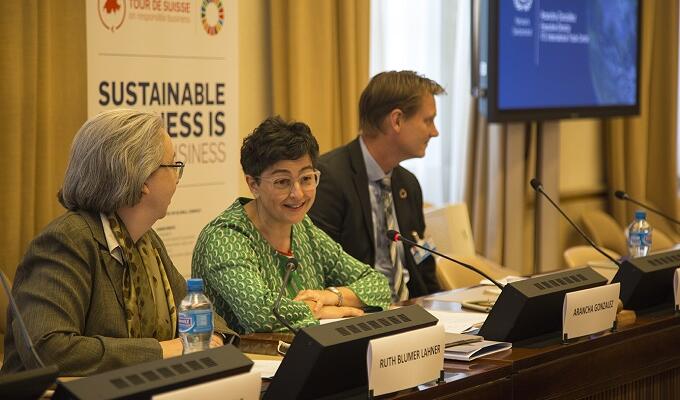

Sustainable production and consumption – a challenge and change for Swiss business (en)
Sustainable production and consumption – a challenge and change for Swiss business
14 June 2018
Geneva, Switzerland
Ladies and Gentleman
Just last week in New York during the discussions on the financing of the SDGs a very clear choice was placed on the table: either the international community agreed to finance the implementation of the SDGs, or the SDGs will not be achieved. The private sector has a central role to play in this debate. The SDGs cannot be achieved without your support, without your commitment and without your partnership.
At the core of this 2030 Agenda is a more prominent role for the private sector as drivers of sustainable development. Businesses must be committed to driving the change towards a more sustainable future. As members of the UN Global Compact Network Switzerland, you are already committed to walk the talk on sustainability and build the business of tomorrow.
But there is more you, we, can do together.
Swiss local businesses ensuring sustainability at home
SMEs constitute the overwhelming majority of firms and are a major source of employment in all economies. Globally, SMEs make up over 95% of all firms, account for approximately 50% of value added and 60-70% of total employment in any country. Micro enterprises are increasingly the largest sources of employment in many developing countries, especially for women and youth.
Switzerland is also a country of SMEs. 99.6% of all Swiss companies have fewer than 250 employees. At the same time, these SMEs account for two thirds of employment in Switzerland, clearly SMEs are the fabric of the Swiss economy. Swiss local businesses not only play a key role as incubators of innovation, inclusive growth and women’s economic empowerment, but have the potential and the means to be real engines of change in developing countries. One area in particular is to support the transition towards the green economies in developing countries just as you transition your own businesses. Let me give you an example of how this can be achieved.
In Colombia, ITC, Swisscontact and the Colombia Cocoa Network have been supporting cocoa producers to understand and comply with international sustainability standards and connect with potential buyers through an online tool developed by ITC. By adopting more sustainable business strategies, Colombian producers are a step closer to tap into international markets. This project funded by the Swiss Secretariat for Economic Development (SECO) makes use the ITC web-based platform Sustainability Map to enable direct linkage between cocoa producers and potential buyers. Sustainability Map brings transparency across sustainability standards applicable to different sectors and enables a direct linkage between business partners around their sustainability standards. As a direct result of the project, Colombian producers were connected with Swiss and other international buyers willing to pay a premium for sustainable cocoa. This is a good example of how local businesses can engage in sustainable consumption and production worldwide. This is an excellent template for us to build on and expand.
Swiss businesses supporting solidarity
By solidarity I mean: those that are doing relatively well do a bit to help those who are doing less well. Solidarity is also key to empower women and marginalized populations. And we need solidarity to connect smaller businesses to international markets, because MSMEs, are the key to making growth and trade more inclusive.
Swiss business has an important leadership role to play in promoting solidarity through responsible conduct in respect of working conditions and transparent value chains. But also when it comes to responsible sourcing to promote more inclusive trade and environmental sustainability.
In Switzerland we see a strong sense of solidarity in the business community. We see examples of how the Swiss private sector has acted as markets for sustainable products from developing countries, as funders of initiatives to promote sustainability in global value chains and as providers of in-kind support through collaborations with multilateral organizations.
At ITC we have been closely working with Swiss companies to create investment and market opportunities for MSMEs. In a pilot with women coffee growers in Rwanda, we supported exports of raw coffee into Europe to be roasted, ground and packaged under contract. The resulting coffee, sealed in eco-friendly Nespresso compatible capsules was marketed online through e-bay and distributed direct to consumers through DHL. By retaining ownership the coffee farmers earn a price equivalent to 25 times what they could earn at the farm gate.
Through a partnership with producer and market organizations, ITC collaborated with the Swiss chocolate company Chocolats Halba and Fairtrade institutions to improve commercial linkages and support the value addition in the cocoa and yam value chains.
These kind of interactions allows the combination of private sector strengths in Switzerland and abroad with ITC’s expertise to promote inclusive and sustainable value chains.
Creating business models for future generations
Going forward “business as usual” is not an option. As economic growth accelerates, unsustainable consumption and production patterns will exacerbate inequality and natural resource depletion. Together with governments and consumers, businesses are central to drive change towards more sustainable production processes in global value chains and domestic consumption patterns.
One area for collaboration within and with the private sector is around reliable and credible product sustainability information. The growth of markets for sustainable products is often impaired by the practice of greenwashing.
The volume of information facing consumers, which can be imprecise, unclear, incomparable, unsubstantiated or irrelevant when guiding their choices. The consumer is indeed increasingly “King” or “Queen”, but supporting informed choices means ensuring good information is available.
Switzerland has been for many years committed to promote transparency in voluntary sustainability standards. The Swiss State Secretariat for Economic Affairs (SECO) has been a great supporter of ITC’s work on this front to promote greater transparency and credibility among voluntary sustainability standards.
It is also about ensuring that we move towards harmonization to avoid a proliferation of diverging and/or unchecked product sustainability labels, which can negatively affect the reputation of credible standards, labels and claims and often results in mistrust and confusion among consumers. Effective sustainability claims on products empower consumers to make more informed sustainable choices. ITC has launched together with the UN Environment and the UN 10YFP Consumer Information Programme Guidelines for Providing Product Sustainable Information to government and businesses. These guidelines are applicable to all regions and company sizes.
Collaboration for knowledge exchange is also crucial for enabling the creation of business models aligned with the SDGs. The Trade for Sustainable Development (T4SD) programme of ITC is an active collaborator of educational programs on sustainability organized by different Swiss institutions such as the Business School of Lausanne, the Faculty of Business and Economics of HEC Lausanne, the Université de Genève (UNIGE) and the Haute Ecole de Gestion de Genève (HEG). These collaborations - generously supported by SECO for the past 8 years - offer a one-stop-shop of integrated sustainability-related solutions and services for SMEs in developing countries. As part of the T4SD initiative, ITC has been collaborating with these institutions in order to foster a network of practitioners and companies involved in sustainable value chain management for the establishment of an International Master Class on sustainable trade. This Master Class will address simultaneously the challenges and solutions for buyers and for suppliers involved in the same supply chains. Devoting know-how, intellectual and financial resources to such collaborations can be a useful factor in achieving environmental and social sustainability.
Concluding Remarks
The 2030 Agenda will not be achieved without your commitment. Today’s discussions will focus on how Swiss business can contribute to sustainable production and consumption patterns. I urge you to see this through the SDGs lens and based on a partnership approach.
As I have often said, doing good and doing business are not inimical. This is how sustainable businesses will be made and built in the future. We at ITC wholeheartedly support Global Compact Network Switzerland’s work on driving responsible business. We stand ready to work with you to achieve our common goals.
I invite you all to join us at ITC’s commemoration of the United Nations International SME Day on June 27th at the ITC where we will focus on youth entrepreneurship, and to participate in ITC’s annual Trade for Sustainable Development Forum in Geneva, on 1-3 October 2018. The event will discuss sustainable trade practices in global value chains vis-à-vis the implementation of SDG 12 (“Responsible Consumption and Production”). This will be an opportunity for us to broaden the partnership and deepen the impact.
The slogan for the United Nations SME day is ‘small business, big impact’. Make this your slogan as well. Contribute to building global ecosystems of sustainable and inclusive businesses that work for people, profit and prosperity.
Thank you.



